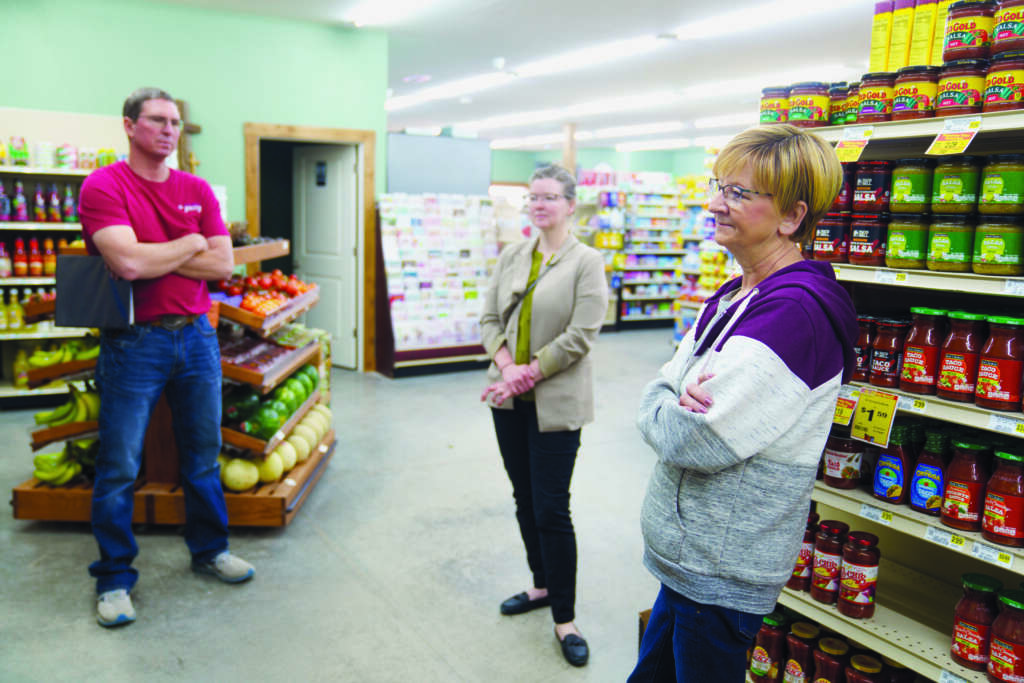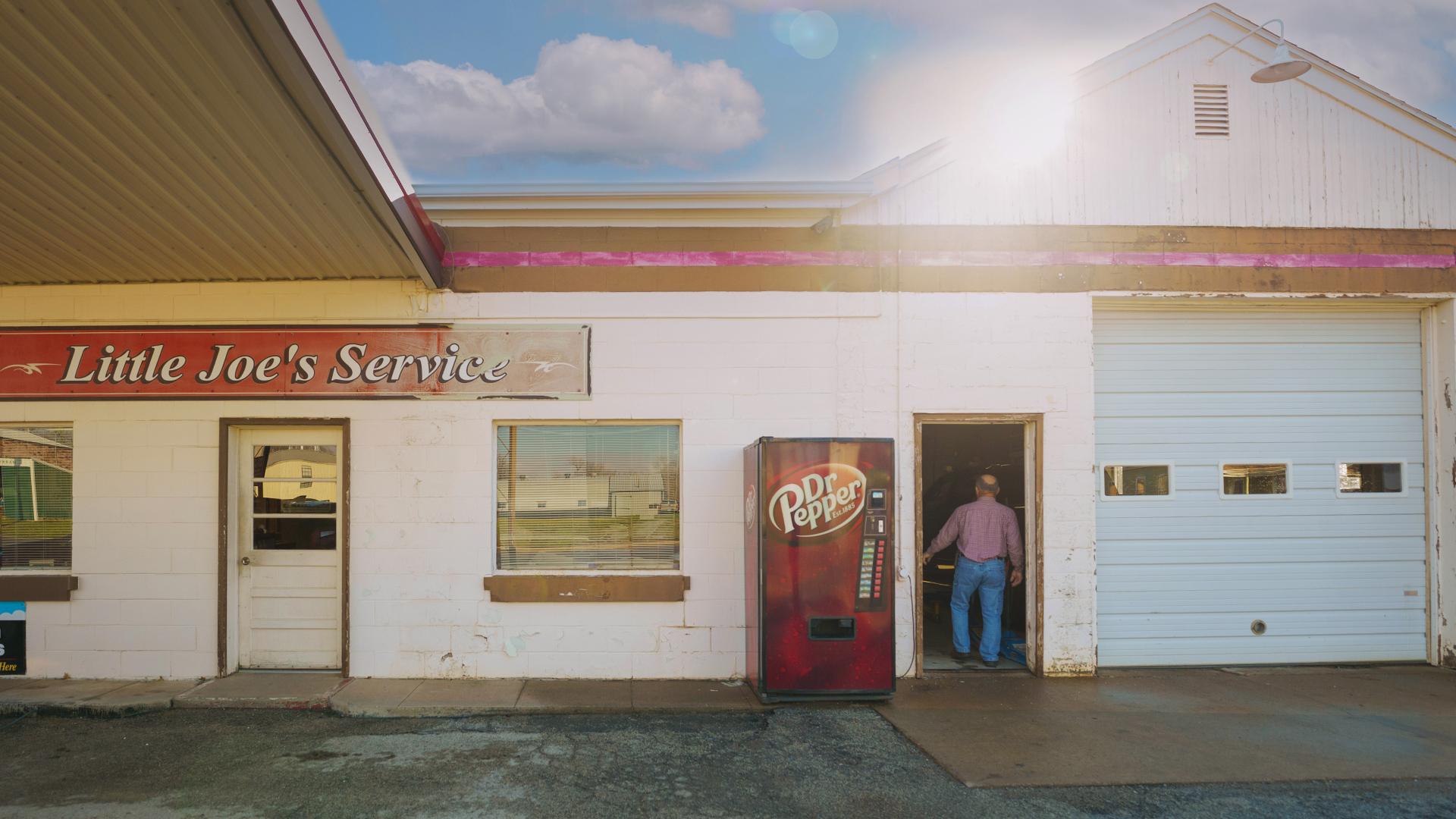Grocery stores are the glue that helps rural communities stick together, so K-State helps them keep the shelves stocked.
On a cool, clear Thursday morning in March, the town of Axtell woke to one of those striking sunrises that only emerge after a night of severe storms in northeast Kansas. As the light glinted off windows and damp streets, many of the town’s 398 residents headed to school and work. Several ducked into the Axtell Community Grocery for a slice of breakfast pizza and a neighborly chat on their way.
The scene may sound commonplace, but the grocery store at the center of it is anything but.
Axtell fought for it. Through an outstanding showing of community pride and grassroots action — combined with the guidance of Kansas State University’s Rural Grocery Initiative (RGI) — this store became a small-town success story worth telling.
What’s the big deal?
In 2022, Axtell’s longtime grocer decided to sell. The town was at risk of losing a vital resource, and it wasn’t alone. According to K-State Research and Extension, 105 grocery stores in rural Kansas closed between 2008 and 2018. And of the affected communities, only half filled the gap with another grocer.

Can’t residents just drive to the next town 26 minutes down the road? Is a closing grocery store really a catastrophe? Yes, if you consider the role it plays in Axtell. For this small town and others like it, a grocery store is more than a place to grab food staples.
“This is so much bigger than a grocery store,” said Bob Lozier, store manager.
At the checkout, Assistant Manager Haley Coonce nodded in agreement, adding, “A lot of our more elderly folks don’t get out as much, and when they do, they’re able to chat for 10, 15 minutes with someone they haven’t seen in a while. It’s not just a place to buy groceries but a central place to interact with others.”
Losing a grocery store is more than an inconvenience for those who can’t drive to the next town. And it’s a serious predicament for cities that can’t afford to send one of their largest sources of tax revenue elsewhere. In rural areas struggling to sustain population numbers, grocery stores also supply much-needed jobs.
“We were aware of K-State’s research showing that housing, population and property values drop off a lot if you lose your store. We’d still have a school, but if we lose the store, we knew it could snowball,” said Bill Buessing, a local farmer and president of Axtell’s grocery board. “At the town meeting, one guy in the back stood up and said, ‘Sometimes you have to do something — you have to just put your head down and bull through it.’ And that’s what we did.”
A shot in the arm
Odd as it may seem for a farming community to become a food desert, research by the Department of Agriculture’s Economic Research Service shows the number of grocery stores outside the nation’s metros declined from 1990 to 2015, while other food retail stores — mostly convenience stores — increased. Drilling down further to nonmetro counties with a population under 2,500 people, the share of grocery stores declined by 15 percentage points.
Convenience stores have their place in rural areas, but they don’t often stock all the components of a fresh salad, let alone a full and nutritious meal without processed ingredients.
During a 2006 listening tour across Kansas to identify challenges in rural communities, K-State learned how dire the circumstances were. The Rural Grocery Initiative was born and quickly became a goldmine of information and resources to keep rural grocery stores afloat nationwide.
“The stakes for rural communities are high, and we’ve seen that a rural grocery store can serve as a barometer for the vibrancy of a small town,” said Rial Carver, rural grocery extension specialist and RGI program leader. “The Rural Grocery Initiative is the national leader in supporting rural grocery stores and rural food access.”
RGI partnered with the Kansas Rural Center and Nebraska’s Center for Rural Affairs to create the Rural Grocery Toolkit, a step-by-step guide to establish or revive a grocery store. Communities can also consult the initiative’s free publications, research and webinars, and find support at RGI’s annual national rural grocery summit.
Think of RGI as a defibrillator for small towns, administering a jolt of energy to restore a pulse.
“Declining populations, aging infrastructure, fierce competition and many owners nearing retirement mean that far too many small-town grocery stores are on the brink of closure, yet these stores are anchor institutions across rural America,” Carver said.
If you want something done
Using K-State as its compass, Axtell set out to save its grocery store. RGI connected the recently elected grocery board to other successful stores in nearby Westmoreland and Holton for shadowing and mentoring opportunities and sent four members to the 2022 National Rural Grocery Summit in Wichita.
Repairs and updates to the old store building would have clearly cost more than starting over, so demo began immediately. Axtell had a $480,000 investment from residents to work with, along with a $21,000 zero-interest loan from the Axtell Economic Development Corporation. The Kansas Healthy Food Initiative, a group comprising RGI and four other organizations, stepped in with a $275,000 loan and $25,000 grant. But would that be enough?
For the right community it would.
So many residents turned up to volunteer, contributing everything from skilled labor to meals for the workers, that the new store was finished less than a year after the old store closed.
“It’s absolutely wonderful what this community has done,” Coonce said. “I’ve lived in a lot of small towns, but this one is definitely strong when it comes to supporting one another.”
From threatened to thriving
Between the American Legion, the Knights of Columbus, St. Michael’s Church and others, there are regular community meals needing supplies from the store.
The previous weekend, organizers of a breakfast for the local fire department needed four trips to purchase more than 100 dozen eggs and 10 cases of bacon.
“I can’t imagine having to travel 20 miles one way for those things,” Buessing said.
No one said it would be easy to keep small-town grocery stores going strong, but Axtell has shown it’s possible. And RGI is there to help each step of the way.




